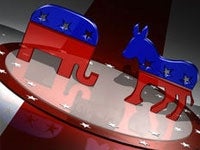 |
With YouTube debates in the primaries and massive social networking campaigns, anecdotal evidence abounded that the 2008 election was a jump-off for the political Web. Now there are some numbers to confirm.
The Pew Internet and American Life Project has found that 55 percent of all adult Americans — and 74 percent of all Internet users — used the Web to find news about the election or share information, the first time a majority of the voting-age population brought their political interest online.
Pew’s study found a deep level of online engagement with the campaign among a substantial minority of Internet users who watched and shared videos, posted blogs and advocated for their candidate on social sites.
“Voters in 2008 were not just passive followers of the political process,” study author Aaron Smith said in a statement. “They used a wide range of digital tools and technologies to get involved in the race, to harness their creativity in support of their chosen candidate, and to join forces with others who shared their same political goals.”
More than half (52 percent) of the survey respondents with social networking profiles sites said they used those sites for political purposes. Among all adult Internet users, 45 percent said they watched political videos, and 33 percent said they shared online political material with others.
At 18 percent, a smaller but still significant minority of users said they were more actively engaged in the political process. This group posted original political content on blogs, social networks and other online forums.
[cob:Special_Report]Smith identified a class of “online political activists” emerging in the 2008 election. These are the types who are more deeply engaged with politics than the average Web user, and they tended to be highly partisan.
“These online activists show a greater interest in news and information with an explicitly partisan slant — particularly when compared with those who use the Internet as a purely information-gathering device,” Smith said.
The study uncovered an uptick in partisanship across the board, with 33 percent of respondents saying they navigated to sites whose politics aligned with their own, up from 26 percent in 2004.
Pew found that Obama backers tended to be more active participants in the online political process than supporters of John McCain, reiterating the findings of earlier studies. Obama supporters were more likely than McCain’s to share political content, sign up online for volunteer activities and contribute money to the campaign.
Online contributions have been widely noted as a key element of the success of Obama’s campaign, which broke all fundraising records in amassing a war chest more than twice the size of his opponent’s.


